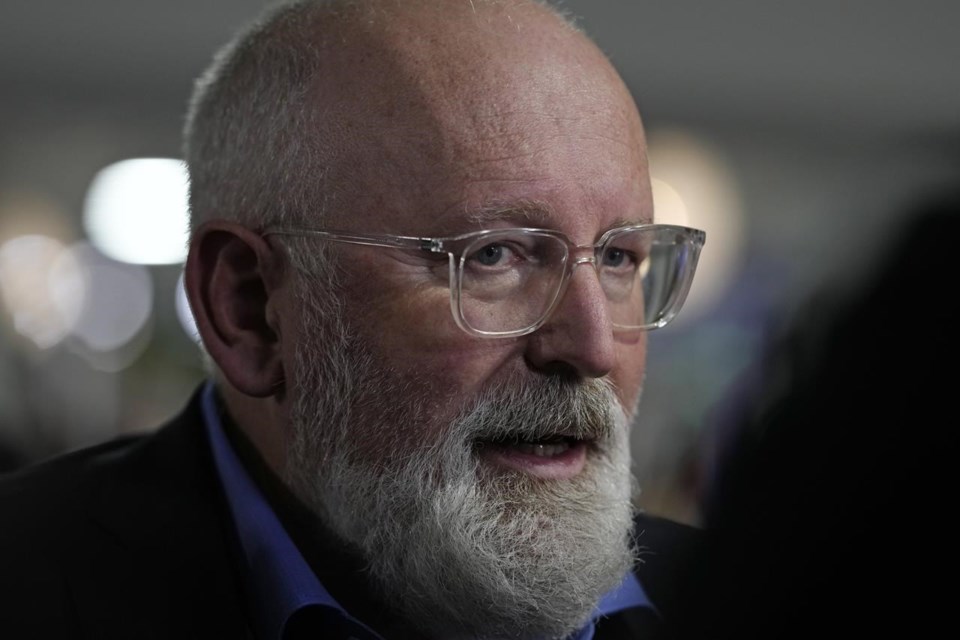BRUSSELS (AP) — Russian President Vladimir Putin unwittingly accelerated the European Union's green transition with his war in Ukraine, with the 27-nation bloc reducing its dependency on Russian fossil fuels and increasing its renewable energy use over the past year, the EU's climate czar said Tuesday.
“The European Union now understands that if we want to increase our energy sovereignty, it can only go through renewables because we have very little gas left, we have almost no coal left, and we have no oil, Frans Timmermans, the commissioner in charge of the European Green Deal, said.
Speaking during an interview with The Associated Press ahead of Friday's one-year anniversary of the Russian invasion, Timmermans said Putin completely underestimated the EU's resilience when Moscow cut off most natural gas flows to Europe amid the war, a strategy European leaders have called energy blackmail.
“He’s been saying publicly that this winter Europeans would freeze and starve," Timmermans said. “Well, we neither froze nor starved because our food production was at high levels. There were no shortages. And our energy: We managed to make sure he didn’t use this weapon in the effective way."
The war, however, fueled an energy price crisis in the EU that sent the bills of households and businesses through the roof.
“Our citizens did have to bear the brunt of his manipulations," Timmermans added. “But he didn’t get us. He didn’t divide us and he certainly didn’t get us on our knees."
In response to reduced supplies of Russian energy, the EU introduced last year counter measures that included launching a nearly 300 billion-euro ($320 billion) program to promote more efficient fuel use and a faster rollout of renewable power.
The EU also introduced embargoes on Russian coal and oil, accompanied by a price cap on Russian oil exports. In addition, the bloc diversified its energy sources by sealing deals for liquefied natural gas to compensate for the loss of Russian gas and fill its stocks for the winter while reducing its use of gas and electricity.
As Putin continues to justify his invasion of Ukraine by accusing Western countries of threatening Russia, Timmermans said the Russian leader's use of energy as a weapon has backfired. In January, gas prices on the European spot market were back to their prewar level.
“He’s losing a lot of income because of this," Timmermans said. “He’s selling his oil and cut prices to India and China. He has to reduce the sale of gas. He thought he could use that as a weapon. But the weapon turned against him, and it has sped up."
Some EU member countries reduced their natural gas consumption by more than 20% this year, Timmermans said. The war "is changing the way we relate to energy and it’s helping us understand that we need to move quicker in terms of renewable energy," he added.
According to the bloc’s data, gas consumption in the EU dropped by 19.3% in the period August 2022-January 2023, compared with the average gas consumption for the same months between 2017 and 2022.
To meet the EU's goal of becoming climate neutral by 2050, the European Commission supports a target of 45% renewable energy sources in the bloc’s energy mix by 2030 as countries look to wind and solar power to bolster their energy security.
According to a review by global energy think tank Ember, “a massive scale-up in clean energy is on its way" in Europe. Wind and solar in 2022 generated a record 22% of the bloc's electricity and for the first time overtook gas, which accounted for 20%. Coal power accounted for 16%.
“We have a unique opportunity to move toward clean technologies that will need no emissions, that will be circular, so you don’t have to keep digging up primary materials," Timmermans said. “If we move in that direction, clean growth is possible. I am optimistic about the potential of that, but we have to move quicker than we’re moving now."
Timmermans insisted that time is running out to keep average global temperatures from rising 1.5 degrees Celsius (2.7 degrees Fahrenheit) above pre-industrial levels. That target, laid down in the 2015 Paris climate accord, appears increasingly doubtful as temperatures have already increased by more than 1.1 C.
“And we need to make sure that our policies will keep us well below 2 degrees of temperature increase," he added. “If we continue with the policies of today, we will overshoot 2 degrees and we will be in a completely different territory."
___
Follow AP’s coverage of the war in Ukraine at https://apnews.com/hub/russia-ukraine and of tje climate and environment at https://apnews.com/hub/climate-and-environment
Samuel Petrequin, The Associated Press



